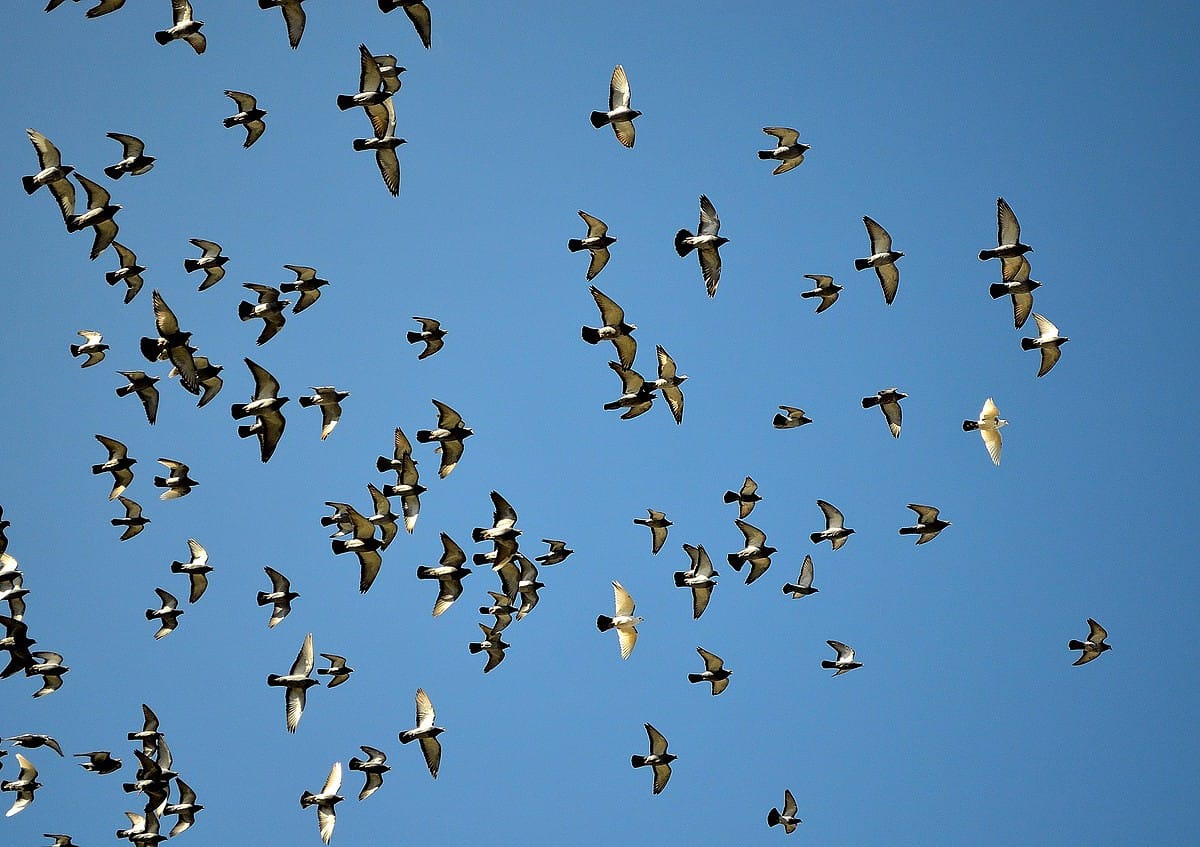By Michael Randall
A long time ago in a public park far away, back when I thought birds were just a minor part of the landscape, I saw a white something in the distance. Possibly it was a white feather, but it stood out against a background of tall dark trees and was doing something feathers usually do not do.
From a height, the feather drifted slowly toward the ground. But just before touching down it went veering away and swiftly climbed twenty or thirty feet in the air. Then it descended again, drifting slowly. Then again it went swooping wildly upward in a big arc. Then it sank slowly once more.
Walking toward it, I finally made out a small group of swallows engaged in their usual daredevil soaring and swerving through the air like little jet fighters. Then I got close enough to see what they were up to: four or five of them were playing a game. One would snatch the downy feather in its beak before it hit the ground, then soar off to a height and drop it. They all soared, watching the feather fall. Then they took turns to swoop in and catch the feather just before it hit the ground, then carry it up high and drop it again. Then another swallow took a turn to dive and catch it, carry it up and drop it.
I stood transfixed for several minutes, grinning like a goof, until the birds finally became bored with their play, and let the feather fall to earth. I watched them soar away to hunt for a bug lunch, then went over and picked up their feather, twirling it in my fingers. It wasn’t nearly as interesting as it had been moments before.
That was a turning point in what I thought about birds. There are perhaps over 10,000 different kinds of birds in the world and a total population of maybe 200 to 400 billion, or 30 to 60 birds for every human on the planet. Of course there are more of us and fewer of them as time goes on, until some tipping point is reached and our own numbers are radically reduced.
About 300 million years ago humans and birds shared a common ancestor. Though it’s not specifically clear what kind of creature that was, mammals (us) and birds both descended from some type of reptile. Since our destinies departed from each other, both humans and birds have been evolving separately, though many birds (like us) have large brains compared to their body size.
In her book, “The Genius of Birds,” author Jennifer Ackerman notes that brain size can be a good thing, but more important is the number of neurons, “…where they’re located and how they’re connected.” Some kinds of birds have high numbers of neurons “…where it counts, with densities akin to those found in primates.” Accordingly, certain birds have highly sophisticated cognitive skills, a combination of thinking, experience and information from their senses (sight, hearing, taste, smell and touch).
Just like humans, birds of the same species have different personalities. Some are energetic and adventurous, others shy and retiring. Some dominate; some submit. Ravens, crows, African gray parrots, Steller’s jays, magpies, humming birds, mockingbirds, sparrows, chickadees and many hundreds of other kinds of birds bravely elbow their way into new situations, but they also have evolved and adopted built-in cautions that help them survive.
A year or so ago, I began feeding the crows in my neighborhood. I started buying stale bread and breaking it up into chunks, but it is not very nutritional. Although I still give them some (they love it), I have added dog kibble which has more food value. I dump these things at the end of my short driveway and it does not take long for it all to disappear. Infrequently, a small piece of kibble or a bit of bread crust will appear on my front porch. Do they give back to me on purpose? Are they just asking for more? I know they recognize me when I am out walking. Several will shriek and follow me along, flying from tree to tree for a minute or two, obviously hoping I brought along some kibble for them.
We diminish the intelligence of birds and other creatures in our thinking. We disrupt their lives, hunt them, destroy the wild places where they live. Still, they think and play and argue. They make babies and teach them to fly. They make tools and converse with each other. They adapt to new situations and food sources, learn how to live beside humans, but also how to avoid us and other predators.
What long-dead Englishman, commenting on human nature, wrote: “Sundays should be different from other days; people may go for walks but may not throw stones at birds.”


